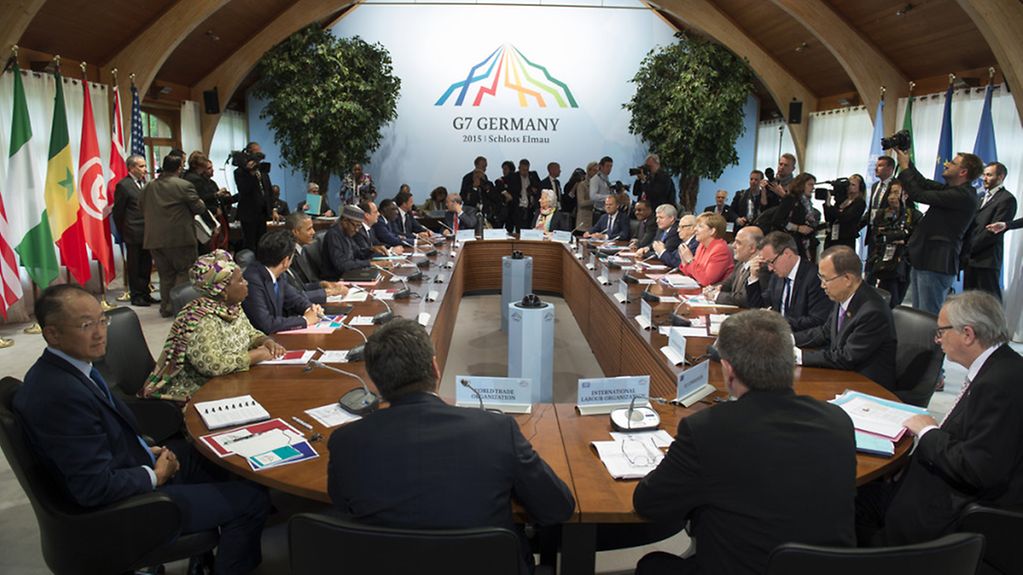Day two of the summit
As the second day of the summit at Schloss Elmau began, climate and energy were top of the agenda for the G7. Participants are now meeting with representatives of African states and international organisations. They will be looking at development cooperation, opportunities for women, and health.
3 min reading time

The G7 meets representatives of African states and international organisations
Photo: Bundesregierung/Bergmann
The heads of state and government from France, the United Kingdom, Italy, Japan, Canada and the United States of America, and the European Council President and European Commission President once again met for talks this morning.
Preparations for the UN Climate Change Conference in Paris
The focus was first on climate policy. The paramount goal of the G7 is to prepare for the UN Climate Change Conference in Paris at the end of the year, where a binding global climate agreement is to be adopted.
For Chancellor Angela Merkel it is important that the G7 participants affirm their commitment to the ‘two-degree target’, i.e. to keep global warming down to a rise of no more than 2°C as compared to the pre-industrial era. She made this very plain in her video podcast on 6 June. The same applies to climate finance. It is important that the G7 confirm their pledge to mobilise climate finance of 100 billion euros a year as of 2020.
In the field of energy, the G7 intend to support the Communiqué from the G7 Energy Ministers’ Meeting. One of the things agreed at their meeting in mid-May in Hamburg was to enhance energy security.
Development cooperation
The G7 is meeting at this moment with representatives of African states and international organisations at the G7 outreach meeting. One topic of discussion is development cooperation. They will be preparing the way for the UN summit in September for the adoption of the post-2015 development agenda, at which new sustainable development goals are to be officially adopted. They will also be taking stock of the extent to which the Millennium Development Goals agreed in 2000 have in fact been achieved.
The G7 also intends to help 500 million people escape poverty and hunger by 2030.
Another focus of discussions was ways of fighting international terrorism.
Health and women
In the field of health, one thing participants will be discussing is the Ebola crisis. The G7 aims to ensure that the international community learns from this epidemic so that it is better equipped to respond to similar disasters in future.
Antimicrobial resistance is another item on the agenda. The aim is to ensure that antibiotics are used correctly and to coordinate both international research work into resistance as well as efforts to identify new antibiotics.
Women in developing countries are also to be assured access to education and self-employment.
The following heads of state and government will be taking part in the G7 outreach meeting:
- Ethiopia (Prime Minister Hailemariam Desalegn)
- Iraq (Prime Minister Haider al-Abadi)
- Liberia (President Ellen Johnson Sirleaf)
- Nigeria (President Muhammadu Buhari)
- Senegal (President Macky Sall)
- Tunisia (President Beji Caid Essebsi).
The heads of the following international organisations will also be represented:
Organisation for Economic Co-operation and Development (OECD) (José Angel Gurría), International Monetary Fund (IMF) (Christine Lagarde), World Bank (Jim Yong Kim), World Trade Organization (Roberto Azevêdo), International Labour Organization (Guy Ryder) , the United Nations (Ban Ki-moon) and the African Union Commission (Nkosazana Dlamini- Zuma).